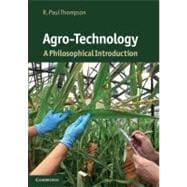
Note: Supplemental materials are not guaranteed with Rental or Used book purchases.
Purchase Benefits
What is included with this book?
| List of figures | p. ix |
| List of tables | p. x |
| Preface | p. xi |
| Introduction | p. xiv |
| Scientific background | p. 1 |
| Population genetics | p. 1 |
| Quantitative genetics | p. 10 |
| Hybridisation | p. 12 |
| Molecular genetics | p. 17 |
| Application of genetics to agriculture | p. 22 |
| Genetic modification of plants and animals: techniques | p. 22 |
| Agricultural biotechnology: current products and future prospects | p. 27 |
| Philosophical and conceptual background | p. 33 |
| A primer of logic, reasoning and evidence | p. 35 |
| Relevant ethical theories | p. 51 |
| Harm and risk analysis | p. 78 |
| The precautionary principle | p. 92 |
| The controversy: ideological and theological objections | p. 101 |
| Advocacy and NGOs | p. 101 |
| Interfering with life | p. 109 |
| Patenting life | p. 121 |
| The controversy: purported benefits | p. 137 |
| Environmental benefits | p. 137 |
| Yield and food security benefits | p. 141 |
| Health benefits | p. 146 |
| The controversy: purported harms | p. 152 |
| Economic and corporate harms | p. 153 |
| Environmental harms | p. 157 |
| Health harms | p. 174 |
| The organic alternative | p. 178 |
| The environment: conventional, organic and GM agriculture | p. 181 |
| Health: evidential lacunae | p. 185 |
| The problem of yields | p. 192 |
| GM and organic: the false dichotomy | p. 194 |
| Impact on low- and middle-income countries: poverty, farming and colonial legacies | p. 199 |
| Concluding remarks | p. 214 |
| Bibliography | p. 216 |
| Index | p. 228 |
| Table of Contents provided by Ingram. All Rights Reserved. |
The New copy of this book will include any supplemental materials advertised. Please check the title of the book to determine if it should include any access cards, study guides, lab manuals, CDs, etc.
The Used, Rental and eBook copies of this book are not guaranteed to include any supplemental materials. Typically, only the book itself is included. This is true even if the title states it includes any access cards, study guides, lab manuals, CDs, etc.